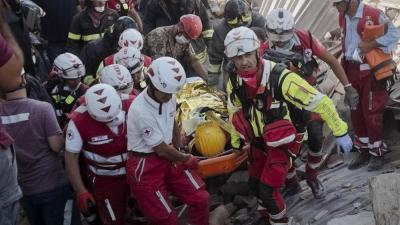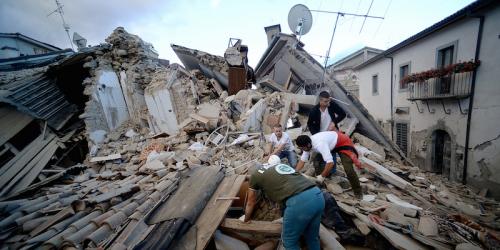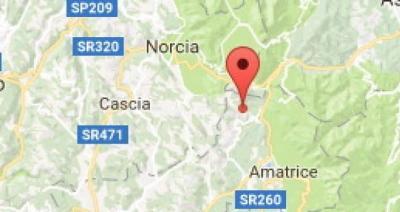Hundreds saved as Italy mourns

RIETI -- Italy Saturday marked a sombre national day of mourning for the hundreds of people killed in the earthquake as the death toll continued to climb despite herculean efforts by rescuers. Despite the rescue of over 238 people from the ruins, as many as 290 people have died. An estimated 2,500 people were made homeless and spent the night following the quake in tents or fields near the worst hit towns of Amatrice and Accumoli north of Rome.
The grim count of fatalaties continued amid growing public anger at the failure of successive governments to enforce anti-seismic building standards despite a succession of deadly earthquakes in seismically active areas, and an investigation has since been opened by magistrates in the provincial capital of Rieti after concerns regarding the sub-standard reconstruction of a school at Amatrice and a clock tower at Accumoli, both of which fell during a further aftershock at 14.37 on Thursday.
Of the 195 feared dead in the former town, 70 are thought to have met their fate under the rubble of the smart Roma Hotel, and as many as 46 people were killed around Pescara del Tronto in the province of Ascoli Piceno in the Marche, which was virtually flattened by the quake. Many of the dead were children, some of whom were heard crying for help from beneath the masonry only to go silent when help did not arrive.
Rescue workers and teams of army engineers from around Italy were racing to the scene with heavy earth moving equipment as civil defence members and firefighters sifted through the wreckage. Many of the towns and villages in the area were crowded with tourists at the end of the holiday season. In all 500 firefighters were working at the scene. An estimated 238 people have been pulled out alive from the rubble by rescue workers, according to Il Messaggero newspaper.
The first, long shock registered at a magnitude of 6 happened at 3:30 a.m. with its epicentre in a mountainous area of the province of Rieti in Lazio north of Rome. A second tremor was felt in the capital at 4:34 am. A series of after shocks, mostly of lesser magnitude, numbering 470 in total, continued to ripple in the area for the following 36 hours.
According to Enrico Boschi, ex-President of the National Institute of Geophysics and Volcanology, there is the possibility of more tremors "in the next few hours and days." He also criticised the nation's attitude to earthquakes in general, complaining that "in Italy, people only follow antiseismic building regulations after quakes take place."
Other seismology experts have likened the event to a similar one in Aquila back in 2009, which left over 300 people dead, but point out that Wednesday's quake was much harder to predict.
As Professor of Planetary Geosciences at the Open University David Rothery said "both occured at a shallow depth (which exarcebates the shaking at the surface) and resulted form local extensional faulting in this tectonically complicated region. However, unlike the L'Aquila quake, which was preceded by swarms of smaller quakes... this one appears to have struck out of the blue."
Either way, the quake severely damaged the town of Amatrice in Rieti province with a number of residents trapped under collapsed buildings, local officials said.
"I am lost for words, this is a tragedy," mayor of the town Sergio Perozzi told RAI Radio 1. "Half the town is gone, there are still people under the rubble, earlier there was landslide, and a bridge might even collapse."
Perozzi was backed up by President of Le Marche, Luca Ceriscioli: "It's a real doomsday scenario, a lot of people had just come back home from their holidays. We just don't know how many people were taken by surprise in their sleep."
"There is a huge mountain of rubble on the street, people are still digging," a witness near the epicentre said. "We'll have to leave our car here and continue by foot. People are crying as they walk, and everyone is making their way towards the centre."
In Rome Pope Francis postponed reading his weekly catechism at his general audience in St. Peter's Square in tribute to the dead, saying he was "heavily moved" by the disaster.
"I cannot help but express how aggrieved I am, and would like to voice my solidarity with those present in every area hit by the quakes, those who have lost loved ones, and those who still feel the tremors out of sheer trauma."
Meanwhile, Prime Minister Matteo Renzi thanked the rescue crews and told the nation he was on his way to the earthquake zone. "We will make every effort to ensure that no-one is left alone, not a single family, not a single commune, not a single hamlet."
Earlier on Wednesday morning, the Italian premier received a message from President of the European Commission Jean-Claude Juncker, where the latter expressed his sympathies with those affected: "On behalf of the European Commission and myself personally, please accept our deepest sympathies. We stand, as ever, in solidarity with the Italian nation and are ready to assist in any way we can."
Italy has often been hit by earthquakes in the past. Three years after the Aquila disaster, a 6.1 magnitude quake in Emilia Romagna left 23 people dead and made 14,000 homeless.
se-lej-jp




